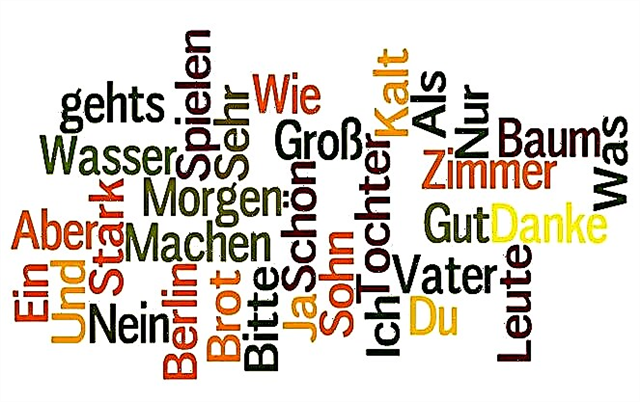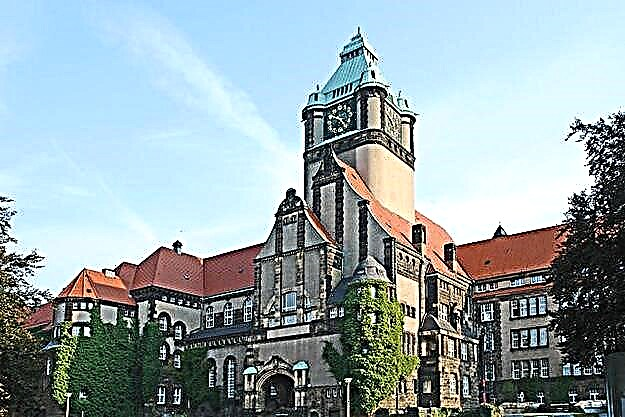For studying abroad, many people choose the Technical University of Dresden, one of the best technical universities in Germany. Today, over 36,000 students are educated here, 3,600 of whom came from different countries of the world. Studying at this university allows you not only to gain quality knowledge and broaden your horizons, but also to get acquainted with the culture of the country, and subsequently get a prestigious job in the territory of the European Union.
What is known about the university
Dresden is the most beautiful city located in Saxony, where modern design harmoniously intertwines with ancient architecture. The city is famous for its museums, theaters, parks and majestic bridges over the Elbe. In addition, it is a well-known European center for advanced technologies, which houses more than 120 research institutes.
The Technical University of Dresden is one of the oldest German universities.
In 1828, an ordinary technical school was created in this city, later renamed the Royal Saxon Polytechnic School, which became the basis of the future university. Until 1871, students studied natural science and technical disciplines there. Then this educational institution received the status of an institute, the number of specialties in it increased. But the university became a technical university only in 1961.
At the moment, it is a full-fledged classical university with a wide academic program for preparing students, which is rightfully proud of its history. Over the years, the teachers of this university were world famous scientists:
- Baron Manfred von Ardenne, a physicist who participated in the creation of the Soviet atomic bomb, who received 600 patents for his inventions at home and abroad;
- Heinrich Georg Barkhausen is a famous German physicist, a member of the German Academy of Sciences since 1949. In addition to various discoveries, he developed the theory of the lamp generator;
- Richard Edler von Mises is a mechanic and mathematician who has devoted his work to fluid mechanics, aerodynamics and the study of probability theory.
- Paul Johannes Tillich is one of the most influential theologians and philosophers of the 20th century;
- Oskar Drude is a botanist and ecologist famous for his system of plant life forms.
The current teaching staff is in no way inferior to their famous predecessors: today about 5 thousand scientists from different countries work within the walls of the University of Dresden, who willingly pass on their experience and knowledge to students.
University faculties
There are 4 areas of study at the Dresden University of Technology:
- natural Sciences;
- medicine;
- engineering;
- humanities and social sciences.
Education at the university is conducted at the following faculties:
- mathematics and natural science;
- philosophy;
- cultural studies, philology and literature;
- jurisprudence;
- pedagogy;
- economics;
- informatics;
- engineering electronics;
- mechanical engineering;
- architecture.
In addition to them, there is also the Faculty of Engineering and Transport named after Friedrich Liszt, the Medical Department named after Karl Gustav Karus, the Faculty of Forestry and the Faculty of Geohydrology, which study the water cycle and the management of water and land resources.
Teaching at the university is conducted in German, with the exception of certain master's and postgraduate programs, which are taught in English.
University programs
In the first two years, university students receive theoretical knowledge. Upon graduation, an intermediate Vordiplom exam is passed, which is compulsory for continuing education. Then the main stage of study in the specialty begins, which includes theoretical and practical studies, after which a diploma is issued.
To obtain a qualification in the chosen specialty, the Technical University of Dresden offers the following options:
- bachelor's degree - the term of study is 3 years. For admission, you must have an Abitur - a certificate of complete secondary education received at a German school;
- Master's degree - the duration of the program is 1-2 years. Admission is possible after receiving a bachelor's degree;
- postgraduate studies - after graduating from a master's degree and receiving a diploma, you can do research work and get a doctorate by writing a dissertation.
The university allows temporary training for 1-2 semesters. Students studying at a university in another country have the right to do so.
Moreover, temporary training is possible only if a cooperation agreement is concluded between higher educational institutions and they participate in student exchange programs. In the course of such training, students study individual subjects without obtaining an academic degree.
On the basis of the university, there are language courses that can be attended by all foreigners who intend to become students of this university.
Scholarships and grants
Scholarships for university students are not provided or paid. Some excellent students are given the opportunity to work part-time at the faculty as assistants.
However, there is the possibility of obtaining short-term scholarships from the German Academic Exchange Service (DAAD) - for this purpose, the organization organizes a competition annually. Detailed information on options for material support from different organizations can be obtained on the organization's website.
To learn more about what students need to get financial aid, see Scholarships and Grants in Germany.
How to enter the Technical University
To be admitted to the university, foreign applicants must have a certain level of education. A regular high school diploma obtained in one of the CIS countries is not suitable in this case, since it does not correspond to the German Abitur document, which is issued at the end of school in Germany. Therefore, to enter the university, you must first graduate from a university in your home country or at least to unlearn it for 2 years.
There is another option for foreigners - training at the preparatory department of Studienkolleg. It lasts 2 semesters. At the end of the course, an exam is taken to determine the suitability of the applicant for study at higher educational institutions in Germany.
In order to enter the Studienkolleg, you need to send an application to the Technical University of Dresden. A prerequisite for admission to the preparatory department is a test in German and, in most cases, in mathematics.
Requirements for applicants
It is important to apply for training on time. This can be done independently through the official website of the university or by contacting Uni-Assit. This is an organization that simplifies the processing of documents for future students and is an intermediary between the university and the applicant.
For admission, you must write an application and prepare:
- certificates of school and university education at home;
- a certificate confirming knowledge of the German language;
- biography and motivation letter;
- a copy of the passport.
The papers must be translated into German and certified by a notary. Submission of documents for a bachelor's or master's degree depends on the semester:
- winter period - from March 1 to July 15. Start of studies on October 1;
- summer period - from October 1 to January 15. Start of studies on April 1.
The time for submitting documents to Studienkolleg or to language courses is from October 1 to January 15.
To qualify for university education, you must prove your knowledge of the German language. International applicants must provide the results of the Deutsche Sprachprüfung für den Hochschulzugang (DSH) exam.
For the Faculty of Education, Law, Medicine, Transport, Engineering and Architecture, you must have a DSH2 or DSH3 level. To enroll in a master's program with English as the language of instruction, you need a TOEFL certificate.
If after submitting the documents you receive an invitation from the university, you can go to the consulate to apply for a visa. To do this, you should prepare the necessary papers in advance and make an appointment. During the interview, you need to be polite and clearly answer the questions posed.
You can find out all the nuances associated with obtaining a permit to enter the country by studying the material on how a student visa to Germany is issued.
Financial expenses
The University of Dresden is a public educational institution, so education here is free. However, each semester, students pay an administrative fee of about 250 euros to the student committee account.
Foreign students who are not EU citizens need to prove financial solvency. This is a prerequisite for obtaining a visa and further study at the university. Confirmation is:
- surety of a German citizen;
- receiving scholarships from various foundations;
- blocked account in a German bank.
An open account is replenished in the amount of 8,640 euros. Then this money is blocked. The student has the right to charge him 720 euros per month. This amount is the living wage in Germany. It is enough to cover the minimum needs. Coracle supports students and helps to set up a blocked account easily and at an affordable price for everyone.
The main monthly expenses of a student are presented in the table:
| Expenses | Amount in Euro |
|---|---|
| Nutrition | 200 |
| Lodging | 300 |
| Insurance | 90 |
| Transport | 40 |
| Textbooks, notebooks | 20 |
| Phone, internet | 20 |
| Hygiene products, personal purchases | 50 |
After enrolling in the Dresden University of Technology, you can apply for a residence in a hostel. The cost of a room without meals is around 250 euros, which is the average for large German cities such as Dresden or Berlin. The amount spent can vary up or down - it all depends on the circumstances and habits of the student.
Some students choose to rent private accommodation. If you rent an apartment for several people, you can save money. Finding a roommate is easy at Studenten-WG or WG-gesucht.de.
Other German universities
The most prestigious higher education institutions, along with Technische Universität Dresden - Dresden Technical University - are:
- Eberhard-Karls-Universität Tübingen - Eberhard and Karl University in Tübingen;
- Ruprecht-Karls-Universität Heidelberg - Ruprecht and Karl University in Heidelberg;
- Ludwig-Maximilians-Universität München - Ludwig and Maximilian University of Munich;
- Freie Universität Berlin - Free University of Berlin.
These universities receive large-scale funding from the state budget for scientific research, they have equipped laboratories and libraries, and eminent professors work there. All this creates a fertile ground for obtaining a quality education.
Finally
Germany is a promising country for higher education. Studying at German universities gives students the opportunity to gain fundamental knowledge that guarantees them quick employment after graduation. In this country, all people have equal opportunities to access higher education, regardless of citizenship. That is why the number of foreign students in Germany is increasing every year.











